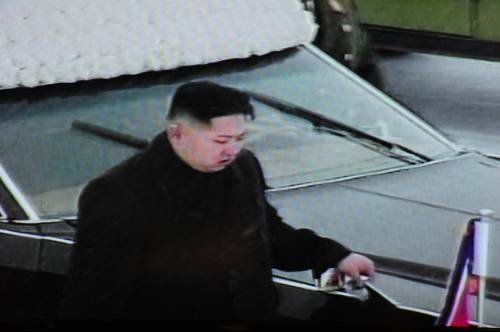Untested heir is saddled with daunting tasks such as shoring up economy, people’s support
After the funeral for North Korea’s longtime strongman Kim Jong-il ended on Wednesday, attention is being drawn to the future of the communist state under the leadership of his third son and successor Jong-un.
While having to grow out from the shadow of his father, the untested heir is now saddled with daunting undertakings such as shoring up the economy, ensuring firm support from his people and establishing a charismatic leadership, among others.
Jong-un, who was internally tapped as successor in January 2009, was introduced to the outside world as heir just in September last year during a convention of the ruling Workers’ Party.
 |
This TV grab taken from North Korean TV on Wednesday shows Kim Jong-un walking beside the convoy carrying the body of his father and late leader Kim Jong-il near Kumsusan Memorial Palace in Pyongyang. (AFP-Yonhap News) |
On the surface, the hereditary power succession appears to be well underway with the North’s sate media hailing him as top leader of both the ruling party and the 1.2-million-strong military.
On the Wednesday’s edition of the Rodong Sinmun, the party’s official daily, top officials in support of Jong-un pledged allegiance to him, saying they would “uphold his leadership” to achieve the goal of becoming a power state.
Despite the media blitz intended to boost his legitimacy as next leader, experts point out that what is urgent for him is to build a strong leadership to ensure loyalty from the power echelon and grassroots.
For the short term, Jong-un will smoothly lead the country with his so-called guardians assisting him in managing state affairs, they said, noting that support for him could erode in the event of policy flip-flops and power struggles.
“The possibility is high that the sole leadership system will weaken given his young age, lack of experience and a short grooming period. In the future, his regime cannot help but falter,” said Chung Kyu-sup, North Korea expert at Kwandong University.
Chung added that for the time being, Jong-un will follow the policy direction his father has set while avoiding making risky decisions to stabilize his country.
“As it basically has to maintain the closed society to continue the third-generation succession and sole leadership system, there is almost no possibility that the North will immediately move in the direction of reform, openness and renouncement of nuclear ambitions,” he said.
Jeung Young-tae, senior researcher at Korea Institute for National Unification, said that Jong-un may not be able to control all powerful state and party organs by himself in the way his father had done.
However, Jeung underscored as the vested interests in the North want stability, the status quo will be maintained least for several years.
“He is, in fact, too weak to control all organs as his father had done. He may control them indirectly with assistance from his supporters. Leaders of the organs, however, could move against him in the future, but for now, things will be smooth on the surface,” he said.
“Though significant policy changes are hardly expected, he may seek economic assistance from the South and through the resumption of the six-party talks, through which he could also seek to improve ties with the South.”
Amid such negative outlooks for Jong-un’s future, some argue that the North has already established a firm foundation for the new leadership legally and institutionally before Kim’s death.
“All preparations in terms of legal, institutional issues and personnel reshuffle had already been done before Kim died. It also gained support for the succession from China and Russia. So it is now pushing ahead with (the succession),” said Yang Moo-jin, professor at the University of North Korean Studies.
The North is expected to announce its policy stances in its New Year’s joint editorials on the state media or early next year in time for a series of major events ― the 70th birthday of Kim Jong-il on Feb. 16, the centennial birthday of national founder Kim Il-sung on April 15 and the 80th anniversary of the foundation of the People’s Army on April 25.
“The start (of the Kim Jong-un era) came abruptly, but it was a start with preparations. There will not be instability for the time being. Situations may change after it may announce its policy stances in time for the big events,” said Kim Young-soo, political science professor at Sogang University.
One of the immediate concerns for Jong-un will be how to meet the economic expectation of the public, particularly when the North plans to enter the stage of a “strong, prosperous state.”
Continuing economic hardships and a failed food rationing system could deepen public discontent, which could serve as an impediment in Jong-un’s efforts to gain public consent over his rule.
To address such concerns, experts say that his adoption of an openness policy may be inevitable, with some saying that neighboring countries should assure the North that it would benefit from it, and that its security will not be threatened under the policy.
By Song Sang-ho (
sshluck@heraldcorp.com)








